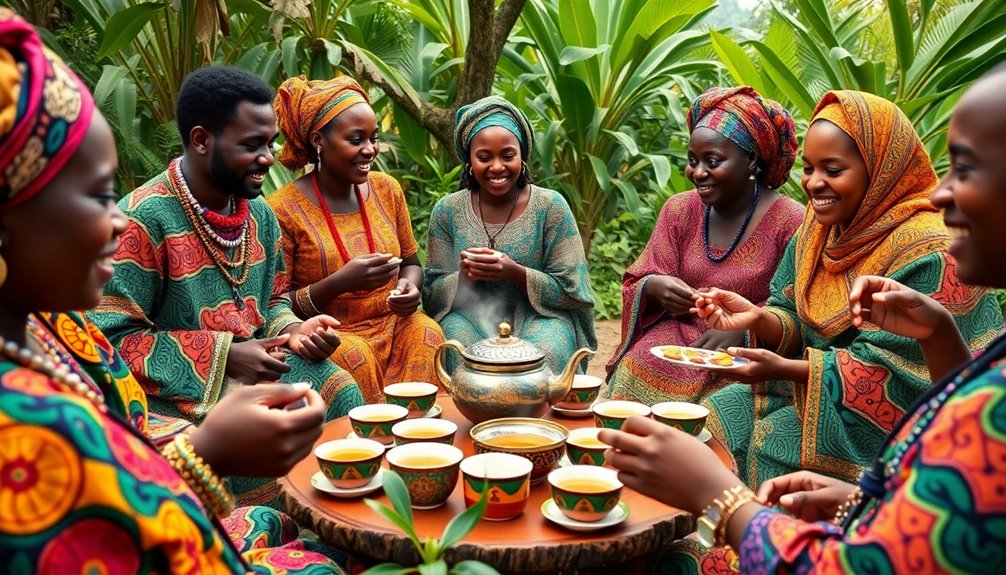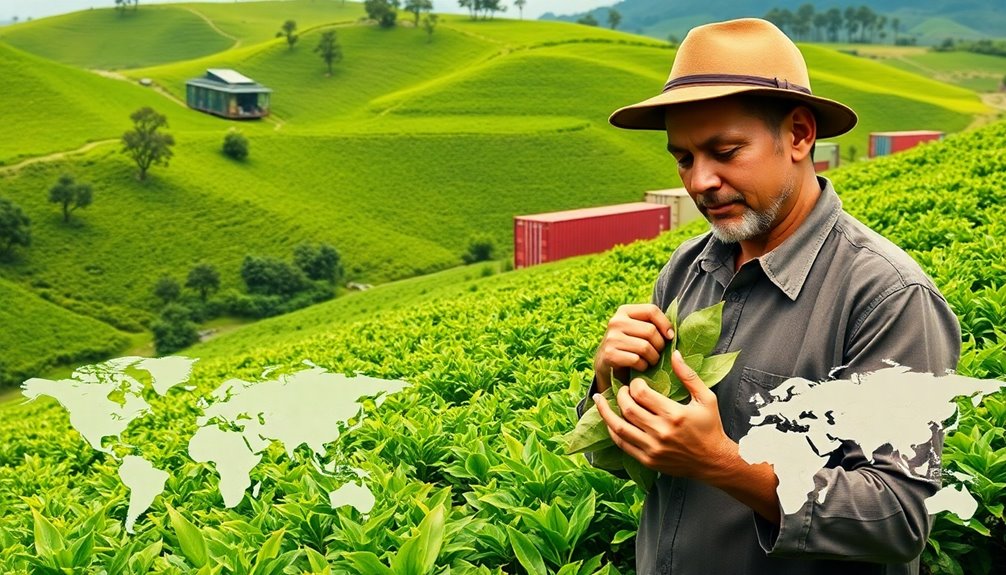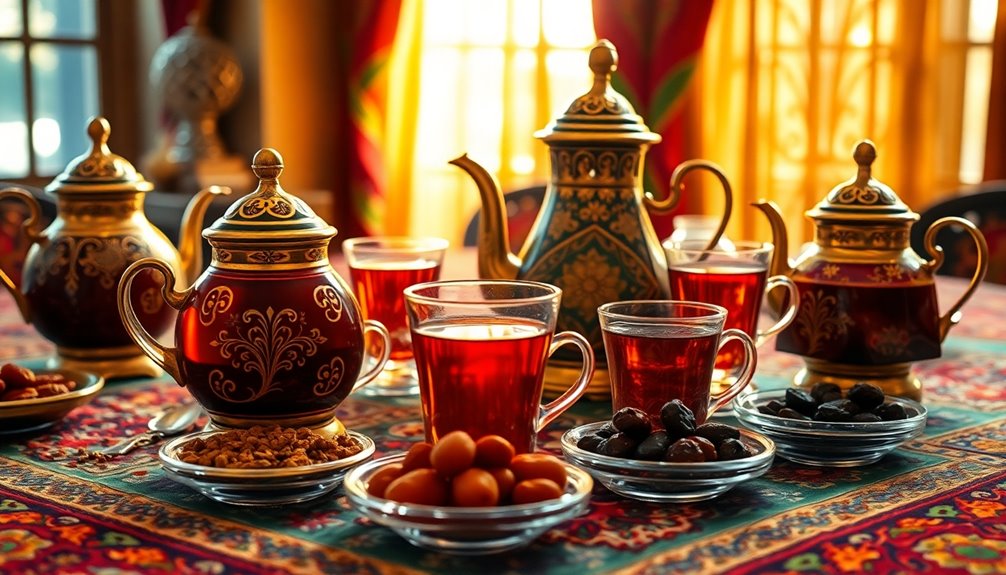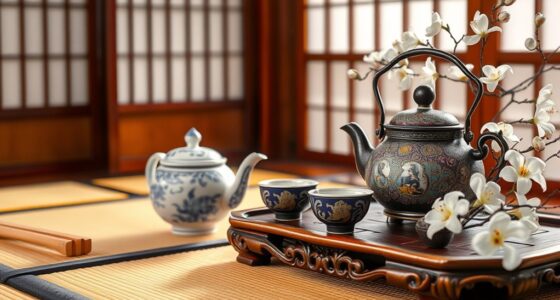Exploring African tea customs shows you a colorful mix of flavors and community spirit that truly brings people together. In many regions, tea is more than just a drink; it's a symbol of hospitality. For example, in Malawi, you might enjoy robust black teas, while South Africa offers caffeine-free rooibos. Tea ceremonies are lively events where stories are shared, making connections stronger. Each region has unique tea rituals that highlight local ingredients and celebrate cultural heritage. By joining these celebrations, you'll experience the joy of community in every cup. And who knows what other delightful traditions you'll discover next?
Key Takeaways
- African tea customs vary by region, showcasing unique flavors like Malawi's black tea and South Africa's rooibos.
- Tea serves as a social binder, fostering relationships and community through shared rituals and gatherings.
- Traditional tea ceremonies encourage storytelling, reinforcing cultural identity and collective memories among participants.
- Unique preparation methods reflect regional heritage, with Moroccan mint tea symbolizing hospitality and generosity.
- Supporting smallholder tea farmers enhances economic stability, improving community well-being and preserving cultural tea practices.
Introduction
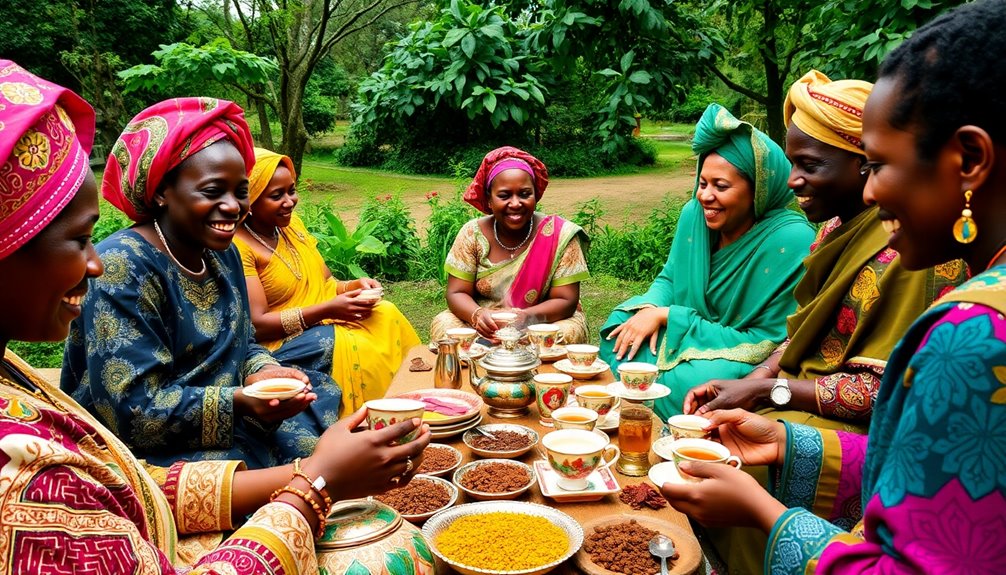
When you delve into African tea customs, you'll discover a vibrant tapestry woven from the continent's rich cultural heritage. African teas come in many varieties, each reflecting unique traditions from different regions. For example, Malawi is known for its robust black teas, while South Africa boasts refreshing caffeine-free rooibos. These diverse flavors not only excite your taste buds but also tell stories about the land and its people.
Tea isn't just a drink; it's a symbol of hospitality. When you share tea with friends or family, you promote community bonding and strengthen relationships. Many cultures in Africa add traditional spices like ginger and cardamom to their tea blends. This not only enhances the flavor but also offers health benefits, making tea a delightful and nourishing choice.
Rituals surrounding tea emphasize participation and shared experiences. When you gather around a pot of tea, you're embracing cultural identity and enjoying moments that matter.
Tea's Role in African Gatherings
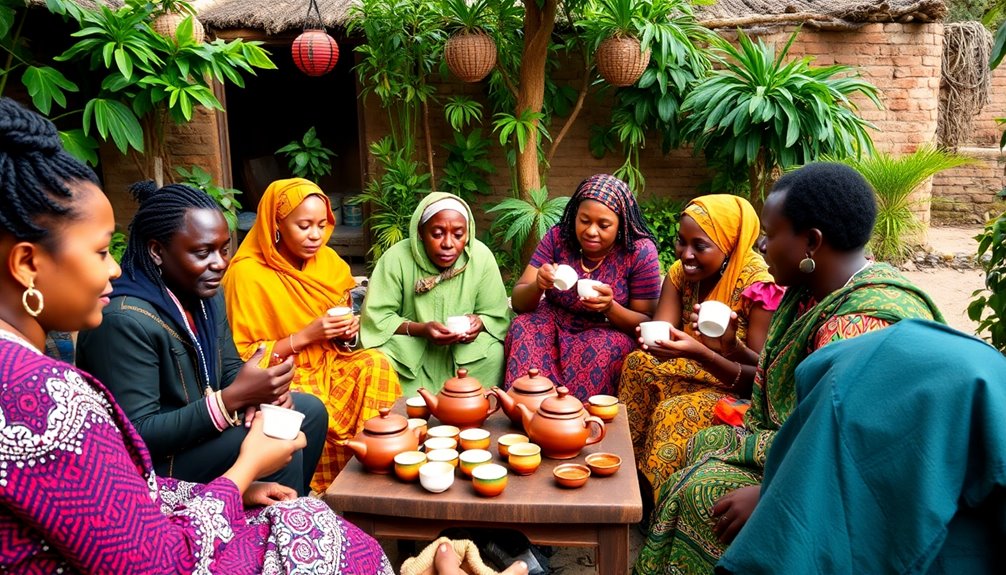
Throughout Africa, tea plays a pivotal role in gatherings, acting as a social glue that unites families and communities. When you walk into a home, you're often greeted with a warm welcome and a steaming cup of mint tea. This special drink, infused with African spices, symbolizes hospitality and friendship.
In many cultures, tea ceremonies are more than just sipping; they're a chance to share stories and connect. In Morocco, the art of pouring mint tea becomes a beautiful ritual that everyone enjoys together.
Similarly, in Ethiopia and Kenya, tea is served during celebrations and festivities, bringing people together over local snacks.
When you share a cup of tea, you're reinforcing community ties, showing respect, and deepening relationships. It's common to find friends and families gathering around, laughing and chatting while enjoying their favorite brews. Herbal teas like chamomile and ginger are also popular choices for those looking to alleviate menstrual discomfort during these gatherings.
These moments celebrate the rich tea culture present across the continent, emphasizing unity and connection. So, next time you participate in an African gathering, remember that tea isn't just a drink; it's a vital part of the experience that brings everyone closer together.
Cultural Significance of Tea Rituals
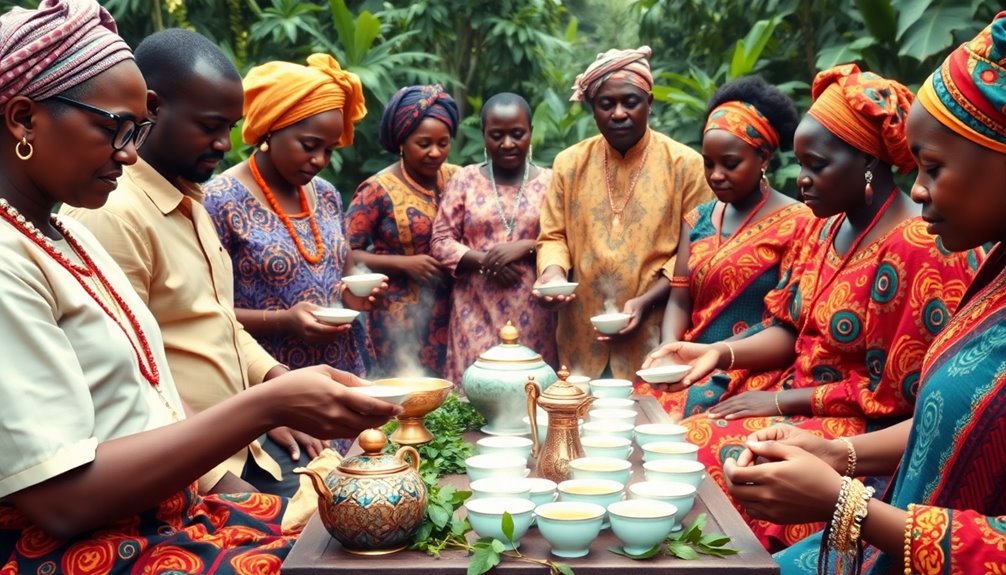
Tea rituals hold deep cultural significance across Africa, serving as a vibrant expression of community and tradition. When you participate in these tea rituals, you're not just enjoying a beverage; you're building community connections and sharing experiences.
Each region has its unique way of tea preparation, reflecting its heritage and customs. For instance, Moroccan mint tea is a symbol of hospitality, often served during social gatherings, where it welcomes friends and family with open arms.
As you sip tea, you'll notice the diverse flavors that represent the rich tapestry of African cultures. These rituals encourage storytelling, allowing you to share cultural narratives that strengthen the collective identity of your community.
You might gather with friends and family, exchanging tales of old while enjoying a warm cup. In many places, tea isn't just a drink; it's a way of life, enhancing bonds and creating memories.
Community-Driven Tea Ceremonies
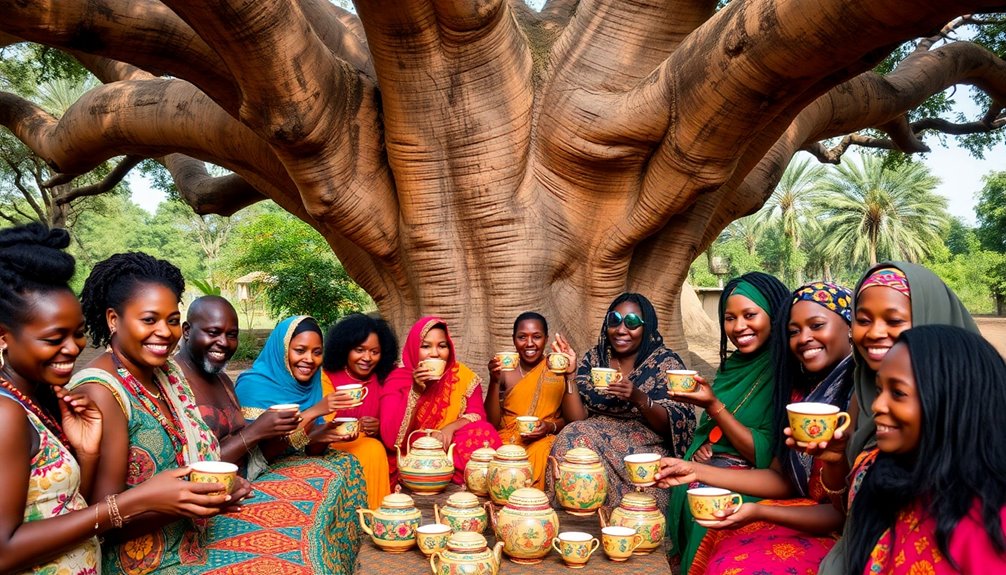
Sharing tea in Africa goes beyond mere enjoyment; it's a communal experience that brings people together. Community-driven tea ceremonies play a vital role in strengthening social bonds and showcasing hospitality. When you participate in these gatherings, you'll notice how everyone contributes, whether it's brewing the tea or serving it to guests. This teamwork enhances the shared experience.
In many cultures, such as the famous Moroccan mint tea ritual, the way tea is poured becomes an art form. It reflects generosity and even status within the community, highlighting the importance of these ceremonies. You'll often find that local ingredients, like fresh mint or spices, are used, celebrating the rich flavors of the region.
These tea ceremonies are more than just a drink; they're a way to honor cultural heritage. By gathering over tea, people share stories, laughter, and traditions that connect generations.
Economic Disparities in Tea Production
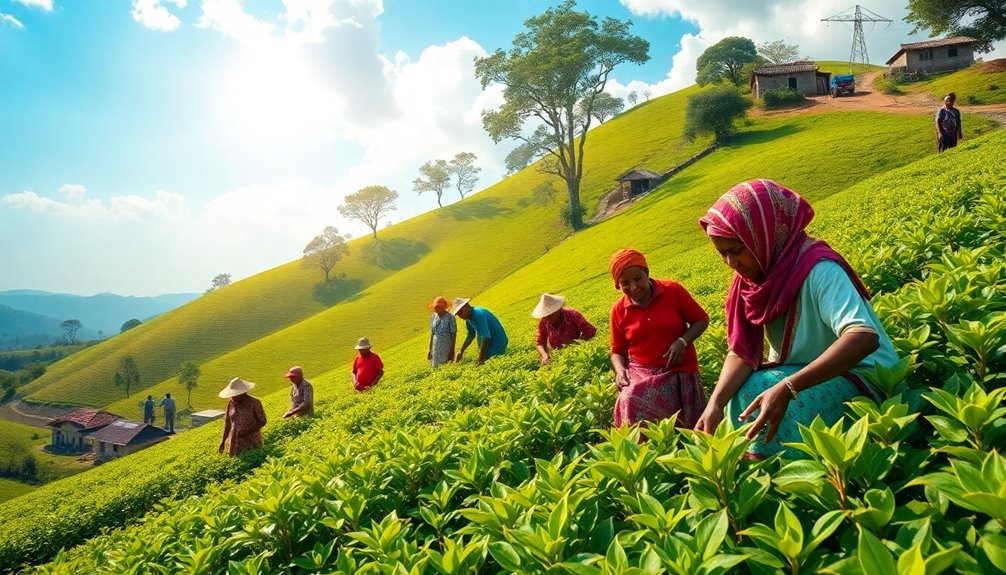
Investing in smallholder farmers is vital.
When they earn more, the quality of tea improves, leading to premium tea that can be sold for better prices.
Additionally, these economic improvements can provide funds for education, healthcare, and infrastructure, making communities stronger.
Practical Applications
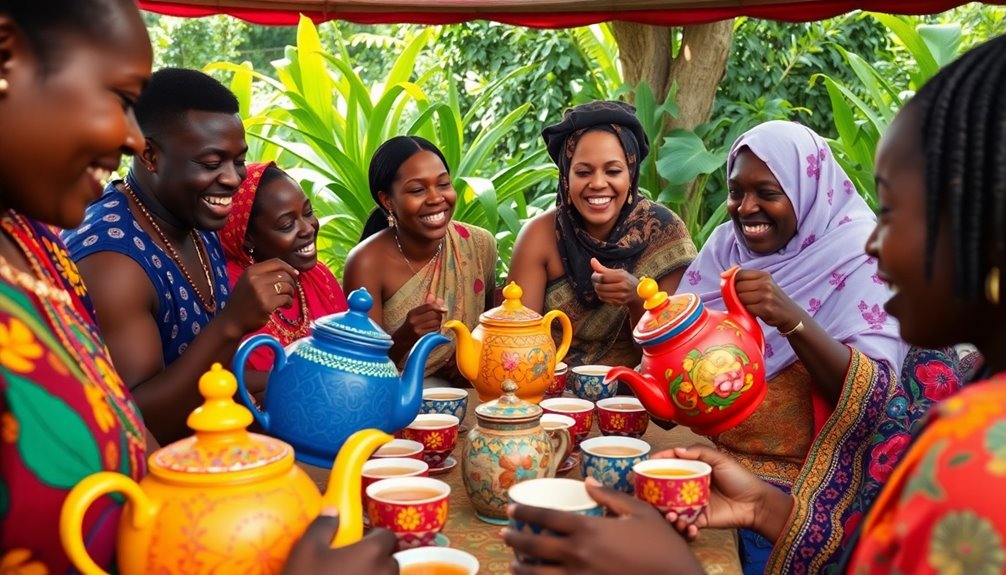
Supporting smallholder farmers not only boosts the economy but also enhances cultural practices like tea customs. When you dive into the heart of Africa, you'll discover that teas are more than just beverages; they're a way to connect with others. Participating in communal gatherings where tea is shared can create lasting memories.
To brew the perfect cup, try following traditional methods like the Moroccan mint tea ritual. It's all about the art of pouring and sharing with friends and family.
As you enjoy robust black teas from Malawi, remember that these daily rituals showcase the rich cultural heritage of the region. Pair your tea with specific snacks or meals to elevate the experience and foster deeper connections.
If you want to learn more about African tea culture, consider joining tea tastings and workshops, like those at Afro Tea House. Here, you can explore the diverse flavors and traditions that define the taste of Africa.
Embrace these practical applications of tea customs and see how they enrich your life and the lives of those around you!
Frequently Asked Questions
What Is the African Tea Ritual?
The African tea ritual involves brewing tea with unique local ingredients, often shared among friends and family. It emphasizes hospitality, connection, and storytelling, creating a warm atmosphere where everyone contributes to the experience.
What Kind of Tea Is Popular in Africa?
In Africa, black tea reigns supreme, especially Malawian varieties. Rooibos' earthy notes and caffeine-free benefits appeal to many. Green tea's health perks are gaining traction, while Moroccan mint tea embodies hospitality during social gatherings. Enjoy these flavors!
What Was the Tea in the Black Community?
In the Black community, tea's more than just a drink; it's a symbol of connection. You'll find herbal blends with spices like ginger and cinnamon, enjoyed for their comforting flavors and health benefits during gatherings.
What Is the History of Tea in Africa?
Tea's history in Africa began in the 19th century, introduced by British colonizers. It spread quickly, leading to the establishment of plantations in Kenya and Malawi, where high-quality teas are now cultivated and celebrated.
Conclusion
In conclusion, exploring African tea customs is a delightful journey that brings people together. Whether you're sipping tea at a community gathering or participating in a special ritual, each cup tells a story. These traditions not only celebrate flavors but also strengthen bonds within communities. By understanding and appreciating these customs, you can join in the excitement and warmth that tea brings. So, next time you enjoy a cup, think about the rich culture behind it!

